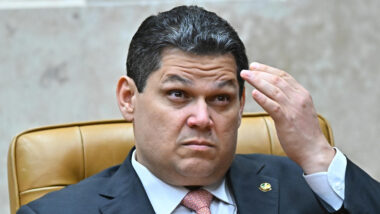
Ouça este conteúdo
Recent reports from Folha de S.Paulo revealed that Justice Alexandre de Moraes established an unofficial unit within Brazil's judiciary, turning it into his own investigative arm. Leaked online conversations from this unit exposed Moraes's deliberate selection of targets for persecution, underscoring how he manipulated investigations by acting as accuser, victim, and judge all at once.
Moraes would instruct his judicial advisor at the Supreme Court, Airton Vieira, to have reports crafted by Eduardo Tagliaferro, then head of the Special Advisory on Combating Disinformation (AEED) at the Superior Electoral Court (TSE). Moraes took advantage of his role as the then-president of the TSE, which operates as an electoral body within Brazil's Supreme Court, to issue directives from his Supreme Court office to the TSE.
While those targeted were aware of the covert nature of some of Moraes's operations, they were nonetheless surprised to learn that the Justice personally commissioned and tailored the reports.
"Even though we were already aware of the unconstitutional nature of the inquiry, where constitutional rights are violated, and they don't even bother informing the accused about the existence of the process, I never imagined that the minister himself would request the Superior Electoral Court (TSE) to produce a report and specify that the source was anonymous. I thought that was too much, but unfortunately, it's the truth," said former Paraná state representative Homero Marchese, one of Moraes's selected targets.
Marchese was censored in November 2022 and had his social media accounts blocked for months after expressing concerns about potential vulnerabilities in Brazil's electronic voting system. In May, a Paraná court ruled that Marchese should receive R$ 20,000 in compensation from the federal government for the moral damages caused by the censorship, but Moraes overturned this decision.
Rodrigo Constantino, a columnist for Gazeta do Povo who also found himself on the judge's blacklist, was shocked by the mafia-like tone of the dialogues. He believes that the certainty of impunity "might have made them more relaxed."
"I already knew that Alexandre was operating completely outside the law and using enforcers, but when you see the kind of language, the behavior, everything that points to the criminal underworld, it obviously causes some shock," he said. "What surprised me most was the mafia-like demeanor, the mafia-like language," he added.
The messages clearly show that the minister requested specific adjustments to suit his preferences, down to the details, during the drafting of the accusation reports that he would later rule on.
In one of the released messages, Vieira instructed the staffer to "go all out" on the report against Constantino. "Eduardo, block and fine him through the STF (Rodrigo Constantino). Please go all out on the report. Haha. Then, send it officially, via email. Thanks," read a segment of the material.
Another victim of these commissioned reports was federal deputy Eduardo Bolsonaro, son of former President Jair Bolsonaro. In conversations from November 2022, Marco Antônio Vargas, a judicial aide to Moraes, asked Tagliaferro to link Eduardo with Argentine marketer Fernando Cerimedo, who had hosted a live stream that year pointing out election irregularities. Criticizing Brazil's electoral system has increasingly been deemed by the court as an ‘attack on the democratic rule of law’.
Eduardo Bolsonaro expressed outrage on social media about being specifically targeted. "I am being persecuted personally by a Supreme Court justice who wants to imprison me. For corruption? For murder? No, for defending my voters and not bowing to the pressures of the powerful," he said.
Parallel Cabinet Defector Fears Moraes's Retaliation
Much like in mafia circles, Moraes is already exercising control over defectors from the parallel cabinet. His recent decision to make Eduardo Tagliaferro, a former cabinet member, a target of the inquiry is an example of this.
In an interview with O Estado de S. Paulo, Tagliaferro expressed his fear of becoming a victim of a vendetta.
"I do have some fears, yes. According to my lawyer, Dr. Eduardo Kuntz, this inquiry shouldn't even exist in the way it was conducted," he said. "In his view, by the minister himself initiating the inquiry and placing me in a position of distrust, it could even result in a warrant for my arrest. That would be very embarrassing because I did nothing wrong. I sincerely hope that doesn't happen."
Impeachment Must Be Pursued Despite Entrenched Judicial Power, Say Targets
Those targeted by the persecution believe that a deeply entrenched network of complicity within the upper ranks of the judiciary makes meaningful change a challenging and lengthy process. Nonetheless, Moraes's impeachment is deemed necessary as an instructive measure.
"I've heard some people say that there's no point in impeaching him because 'Lula will just appoint another communist.' What these people are overlooking is precisely the instructive factor. Alexandre de Moraes today is the biggest symbol of the regime of exception, political persecution, oppression, authoritarianism, the dictatorship that Brazil is currently living under," asserts Constantino. "I think it's crucial for the country that Alexandre de Moraes doesn't go unpunished after everything that has come to light."
Marchese also believes that "the impeachment request is quite important" and recalls that "history is full of examples where power shifted hands, and those who were the accusers, the ones leading the measures against others, ended up becoming the accused."
"The power structure changes, and society feels the need to settle accounts with the past. I think it's important, for that reason, to document what's happening, inform people, and increasingly expose what's going on, because it might take some time, but I believe justice can be served," the former representative comments.
For Constantino, a disheartening scenario would be if nothing happens after all the revelations against Moraes. "If this all gets swept under the rug, I truly believe that this time – and I’m not exaggerating – it's fair to say Brazil is done as a serious country, as even an unfinished attempt at a republic. It’s over. It would be the infamous ‘game over’."



